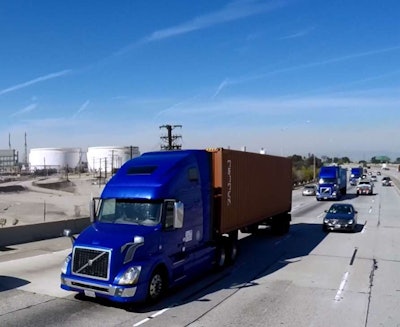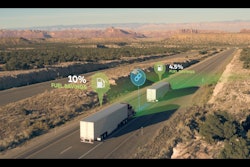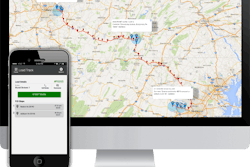 Three Volvo VNL 670 tractors hauled cargo containers from the Port of Los Angeles along Interstate 110 in Southern California.
Three Volvo VNL 670 tractors hauled cargo containers from the Port of Los Angeles along Interstate 110 in Southern California.Volvo Trucks announced Monday it completed a successful demonstration of a partially automated truck platoon in California, leveraging Cooperative Adaptive Cruise Control technology to run a three-truck platoon from the Port of Los Angeles along Interstate 110.
The three Volvo VNL 670 model tractors hauled cargo containers in simulated real-world conditions, Volvo says, traveling at speeds of 55 mph while maintaining a 50-foot following distance — closer than usual for most on-highway tractor-trailers.
Volvo, who began exploring platooning technology via a partnership with Peloton in April 2015, says the recent platooning demonstration was conducted with Partners for Advanced Transportation Technology at the University of California-Berkley.
Forward-looking sensors and vehicle-to-vehicle communication helped maintain speed and spacing without driver intervention, Volvo says. Staged and unplanned vehicle cut-ins also occurred, allowing the platoon to handle common traffic situations.
The Cooperative Adaptive Cruise Control (CACC) used in the demonstration is a more advanced system than the adaptive cruise control tech available in most tractors today.
The system allows trucks to enter into and hold platoons. Volvo notes the system is meant to aid drivers, not replace them.
“Truck platooning can benefit freight companies and professional drivers alike through safer, more fuel-efficient operations,” said Magnus Koeck, Volvo Trucks vice president of marketing and brand management. “Vehicle-to-vehicle communication is pivotal for platooning systems; it helps reduce the reaction time for braking and enables vehicles to follow closer. Reducing the traveling distance between vehicles not only reduces the aerodynamic drag, but also allows for greater highway utilization, thereby helping to alleviate traffic congestion.”
The CACC technology being developed in conjunction with PATH has been sponsored by the U.S. Department of Transportation/Federal Highway Administration Advanced Research Program and Caltrans. Other project partners include Cambridge Systematics, Inc., the Los Angeles County Metropolitan Transportation Authority, and Gateway Cities Council of Governments.









